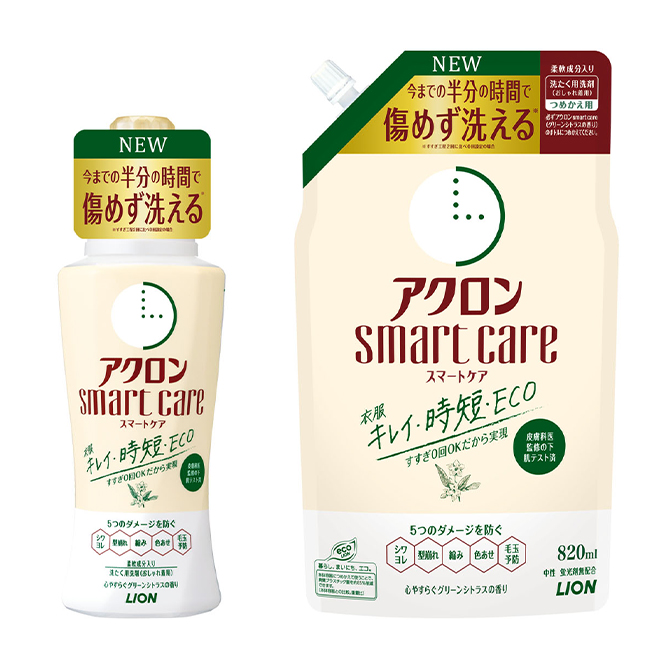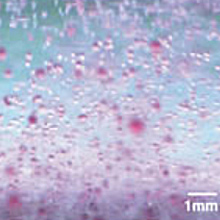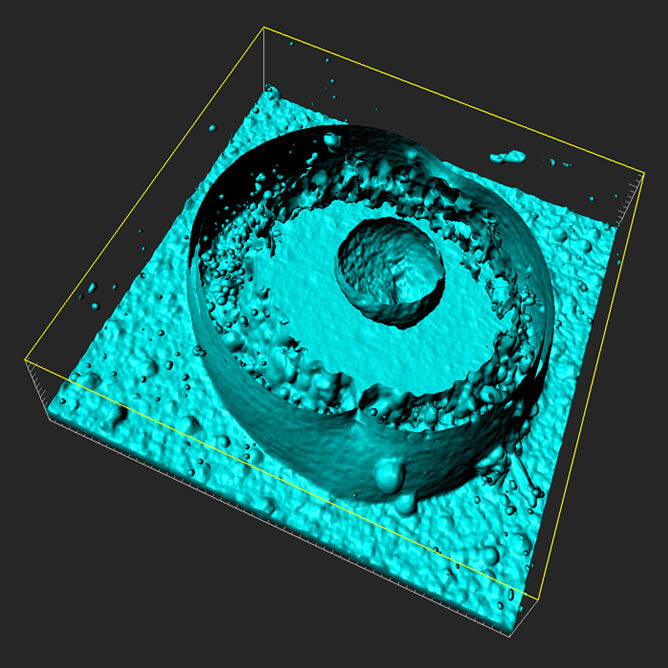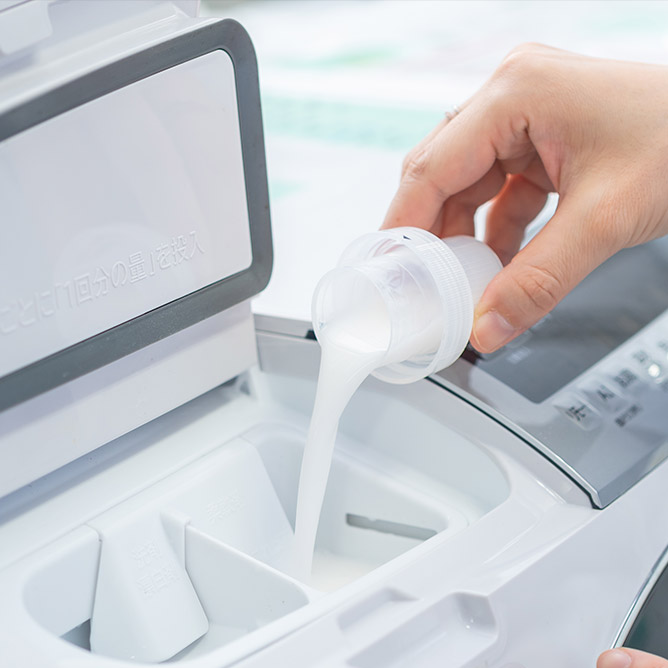Lion is not only focused on delivering new value that enhances the comfortable and healthful lives of individual consumers, but it is also creating products that contribute to reducing environmental burden in order to realize a sustainable planet. From a consumer household, water and electricity-intensive housework, such as laundry, can have an effect on the environment. Laundry is one of the most environmentally burdensome housework due to the large volume of water consumed. To minimize the amount of water required for laundry, we concentrated on the rinse stage, which accounts for the majority of water consumption, seeking to develop a technology that makes rinse-free washing a reality.

Conventionally, the rinse stage is run after the wash stage is completed to remove the stains and residual surfactants left on the clothing by the washing stage. This means that to accomplish rinse-free washing, all the lifted stains must be eliminated during the wash stage and not allowed to redeposit to clothing, and any remaining surfactant must also be removed. Therefore, we considered the use of functional ingredient other than surfactants to increase detergency while also lowering the amount of surfactant added. In addition, we believed that such functional ingredients need to be able to effectively adsorb soil and prevent it from redepositing to clothing. Acron Smart Care ingredient was thus chosen as an ingredient that meets these requirements. (Figure 1) Even when the surfactant concentration is reduced to half that of conventional detergents, we found that detergents with this ingredient have the same level of detergency as conventional detergents. (Figure 2)


The redeposition of soil is another factor that contributes to the progressive darkening of clothing. While conventional detergents use surfactants to stop soil redeposition, rinse-free washing requires the amount of surfactant used to be reduced, so other ingredients are needed to disperse soil substances. We examined different components and found that the inclusion of the Acron Smart Care ingredient resulted in the same anti-redeposition performance as conventional detergents, even when the surfactant concentration was reduced to half. (Figure 3)

Since the detergents incorporating Acron Smart Care ingredient showed the same level of detergency performance as conventional detergents, even under conditions of low surfactant concentration, we hypothesized and verified that Acron Smart Care ingredient and surfactant form a complex and that this complex efficiently adsorbs the main component (fatty acid) of sebum stains. Because absorption involves a chemical reaction that produces heat, we measured the heat generated when fatty acids were added to a solution of surfactant and the Acron Smart Care ingredient. This resulted in an exothermic reaction was observed, confirming that fatty acids are adsorbed. (Figure 4) This suggests that the three components—the surfactant, the Acron Smart Care ingredient and the fatty acid—form a complex. Furthermore, it was discovered that this complex possesses a comparatively high capacity to lower the interfacial tension of fatty acids. This implies that the complex functions as a new detergent component in itself, achieving high detergency even in the presence of minimal surfactant.

Assuming that a complex of a surfactant and a component of the Acron Smart Care ingredient (hereafter referred to as the “Acron Smart Care component complex”) contributes to the dispersibility of stains (fatty acids) that create stains and has anti-redeposition ability, the effect of the Acron Smart Care component complex on fatty acid dispersibility was verified. Dispersibility was evaluated by adding red-colored fatty acids to each detergent solution, stirring, and evaluating the level of redness at the center of the solution in terms of adsorbance. The results showed that the fatty acids remained dispersed over a longer period under low surfactant concentration conditions with the addition of Acron Smart Care ingredient. (Figure 5)

Based on the above results, we have achieved a rinse-free washing technology that utilizes the Acron Smart Care ingredient.
The rinse-free washing technology established in the study will not only reduce environmental burden by reducing water consumption during washing, but also reduce damage to clothes by shortening laundry time while offering an easier way to wash clothes. This technology has been applied to Acron Smart Care, a laundry detergent (for delicates) with fabric-softening ingredients.

R.Takei, et al., 2023 AOCS Annual Meeting & Expo, 30 April to 3 May., Denver, USA

Rinse-free washing technology incorporated into Acron Smart Care, a laundry detergent (for delicates) with Fabric-softening agents a built-in softening agent

Nano-Washing Verified Using Small-Angle X-Ray Scattering

Applying Biointerface Research to Maximize Active Ingredient Effectiveness

Using Aggregate Control Technology to Enhance Product Functions
Related Information